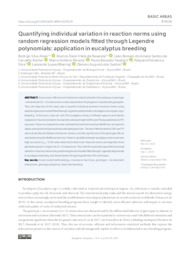Quantifying individual variation in reaction norms using random regression models fitted through Legendre polynomials: application in eucalyptus breeding.
Quantifying individual variation in reaction norms using random regression models fitted through Legendre polynomials: application in eucalyptus breeding.
Author(s): ALVES, R. S.; RESENDE, M. D. V. de; ROCHA, J. R. do A. S. de C.; PEIXOTO, M. A.; TEODORO, P. E.; SILVA, F. F. e; BHERING, L. L.; SANTOS, G. A. dos
Summary: An accurate, efficient and informative statistical method for analyses of genotype × environment (G × E) interactions is a key requirement for progress in any breeding program. Thus, the objective of this study was to quantify individual variation in reaction norms using random regression models fitted through Legendre polynomials in eucalyptus (Eucalyptus spp.) breeding. To this end, a data set with 215 eucalyptus clones of different species and hybrids evaluated in four environments for diameter at breast height (DBH) and Pilodyn penetration (PP) was used. Variance components were estimated by restricted maximum likelihood, and genetic values were predicted by best linear unbiased prediction. The best-fitted model for DBH and PP was indicated by the Akaike information criterion, and the significance of the genotype effects was tested using the likelihood ratio test. Genetic variability between eucalyptus clones and very high accuracies ( r^gg >=0.90 ) were detected for both traits. Reaction norms and eigenfunctions generated genetic insights into G × E interactions. This is the first study that quantified individual variation in reaction norms using random regression models fitted through Legendre polynomials in eucalyptus breeding and demonstrated the great potential of this technique.
Publication year: 2020
Types of publication: Journal article
Unit: Embrapa Coffee
Observation
Some of Embrapa's publications are published as ePub files. To read them, use or download one of the following free software options to your computer or mobile device. Android: Google Play Books; IOS: iBooks; Windows and Linux: Calibre.
Access other publications
Access the Agricultural Research Database (BDPA) to consult Embrapa's full library collection and records.
Visit Embrapa Bookstore to purchase books and other publications sold by Embrapa.

